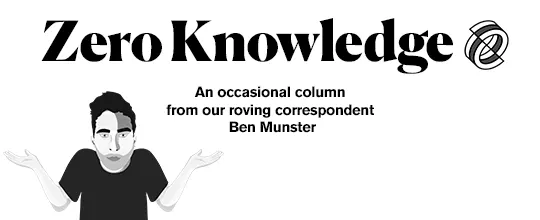
Is supporting the Ukrainian resistance worth jettisoning one of crypto's most sacred principles: financial sovereignty?
That question arose yesterday, when Ukraine’s deputy prime minister beseeched several major crypto exchanges—among them Binance and Coinbase—to unilaterally ban all Russian users from the platform and freeze their holdings.
Though many non-crypto businesses and banks had already voluntarily severed ties with Russia’s citizens, the crypto companies appeared to be having none of it. After all, given that crypto’s entire value proposition is that it confers financial sovereignty, who could have faith in the exchanges if they said yes? (And worse still: Think of the shareholders!)
“Crypto is meant to provide greater financial freedom for people across the globe,” Binance, the world’s largest exchange by trading volume, told CNBC. “To unilaterally decide to ban people’s access to their crypto would fly in the face of the reason why crypto exists.”
Crypto investor Mike Alfred, meanwhile, wrote, “I am pulling my support for Ukraine based on these comments. This is evil, plain and simple.”
The problem
Shouldn’t we be doing all that we can to limit Russia’s ability to finance its war? While some argue that the right of Russians to control their wealth remains paramount, others are not so sure, arguing that the price of war unimpeded is higher than the flouting of some glib libertarian principle. What, pray tell, is the right position to take?
As has been repeatedly pointed out, governments have not asked exchanges to ban regular old Russian citizens from trading crypto. At least not yet. So crypto exchanges are currently legally in bounds. And while they have already fulfilled U.S. demands to block transactions associated with sanctioned Russian entities, they have not, as other bodies such as FIFA have done, opted to censor users without government intervention.
Even here, though, there is disagreement over whether this is a good thing. Some, like Sen. Elizabeth Warren, would doubtless like to see the exchanges ban Russians. (Which, I suppose, is neither here nor there since she’d like to see exchanges shut down for everyone.)
But even among more rational people, opinion is divided over whether the need to contribute to the total freeze-out of the Russian economy (in the service of helping Ukraine and its beleaguered citizens) trumps that of crypto’s existential purpose of protecting individuals’ financial sovereignty. That is, ought sovereignty be discounted after certain lines are crossed?
One argument is that if you opt to hold your funds on a centralized exchange like Coinbase, you are not deserving of uncensored financial sovereignty. These regulated entities are obliged to comply with the laws of their jurisdictions, and wholesale destruction would await them if they refused a U.S. court order—not least in the midst of war. As Kraken CEO Jesse Powell wrote on Twitter, while Kraken would never freeze accounts voluntarily, it would, however reluctantly, do so with a legal requirement.
This was not especially well received.
“We love Kraken but we are taking our assets off your exchange due to this reason!” one commenter wrote.
To ban or not to ban
Regulatory pressure aside, what is the correct philosophical position here? Is it better to encourage NATO to bomb the 40-mile long military convoy that is heading, ominously, to Kyiv? The danger is that this will provoke, uh, widespread vaporization.
So the question comes down to how the economic war—the supposedly nonlethal alternative—ought to be waged. Target only the powerful, or sanction the entire population into economic ruin?
On the one hand are the sanction-them-all advocates. Screw the right to “financial sovereignty” of everyday Russian citizens, they say! It must be discarded as a kind of wartime sacrifice. Lives, more than mere riches, are at stake.
The obvious counter-argument is that doing this would set an awful precedent for crypto. The tech’s entire appeal depends on its adherents’ agnosticism toward the ideology or creed of those using it: They will defend the mass-murderer’s right to his billion-dollar NFT, they will defend the state bankrolling a violent war of territorial conquest, and they will defend you.
Means or ends?
Neeraj Agrawal, the comms director for crypto pressure group Coin Center, has a more pertinent take. Today he tweeted disparagingly, and mockingly, of people “foaming at the mouth to cut off innocent people who didn’t want this war from the financial system, to force them into a desperate revolution against their leaders, or something like that.”
Moved, I actually DM’d Agrawal and asked him to expatiate in a brief interview.
Indeed, the great man seemed to think that targeting the entire Russian population would be morally wrong in and of itself, regardless of any highfalutin crypto principle. The purpose of the sanctions seems to be to “inflict max pain on certain actors while hopefully minimizing collateral damage, rather than the point itself being the suffering," he said.
To go beyond that would be the economic-warfare equivalent of switching to bombing civilian centers over, say, arms depots. “I’ve seen some other views, that the idea is to make the people suffer to the point where desperately revolting is the only option,” Agrawal said. “I don’t think that has worked historically.”
It’s a sentiment that’s been echoed elsewhere: That destroying the lives of ordinary Russians would only serve to diminish apparent popular disapproval of the war.
This perspective holds the prospect of an all-out-ban as wrong not only because it is immoral, but because it won't work, strategically. Much of what goes on in war is immoral by normal standards, but relativism rules here. The question is whether the ends even justify the means, and Agrawal et al believe that in this case they don’t. There is historical precedent for this view: Sanctions have been known to breed contempt among affected populations. Remember the Treaty of Versailles?
Ultimately, though, this might all not matter. The exchanges will likely lose either way, either getting crushed for non-compliance or complying and finding themselves widely discredited. And even if Russian crypto holders transfer their holdings to private wallets, there is debate over whether they’d even be able to cash out into rubles they could spend on real world goods and services. They may be able to cling onto their wealth, but it probably won’t be of much use. Especially if Putin pushes the big red one.

